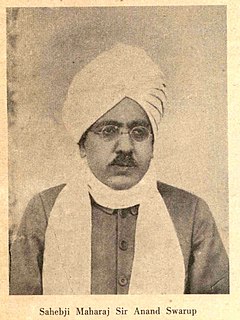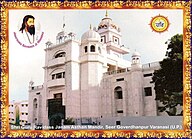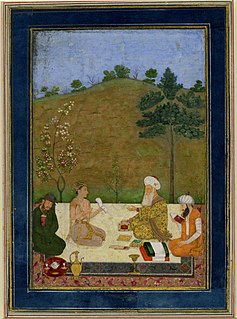Related Research Articles
Hindi literature includes literature in the various Hindi language which have writing systems. It is broadly classified into four prominent forms (styles) based on the date of production. They are:
Surat Shabd Simran is a type of spiritual meditation in the Sant Mat tradition.

Radha Soami or Radhasoami Panth is a spiritual tradition founded by Seth Shiv Dayal Singh Ji in 1861 on Basant Panchami Day in Agra, India.

Seth Shiv Dayāl Singh, called by the honorific "Param Purush Puran Dhani Huzur Soami Ji Maharaj" by his disciples and devotees, was born on 25 August 1818 in Agra in the colonial era British India, and died on 15 June 1878 in the same city. His parents were followers of a spiritual guru Tulsi Saheb. Seth Shiv Dayal Singh is considered the founder of Radhasoami movement – a 19th-century spiritual faith.

Sir Anand Swarup, Kt. also known as Param Guru Huzur Sahabji Maharaj was the founder of Dayalbagh. He was the fifth revered leader, or Sant Satguru, of the Dayalbagh branch of the Radha Soami faith, who succeeded Sarkar Sahab in 1913. He also laid the foundation of Radhasoami Educational Institute, a co-educational middle school which opened in 1917 and later expanded and developed as Dayalbagh Educational Institute. He wrote many holy books on the Radhasoami faith, explaining the concepts of Surat Shabd Yoga and objectives of Radhasoami in general.

Nazeer Akbarabadi was an 18th-century Indian poet known as "Father of Nazm", who wrote Urdu ghazals and nazms under nom de plume (takhallus) "Nazeer", most remembered for his poems like Banjaranama, a satire.
Sant Mat was a spiritual movement on the Indian subcontinent during the 13th–17th centuries CE. The name literally means "teachings of sants", i.e. mystic Hindu saints. Through association and seeking truth by following sants and their teachings, a movement was formed. Theologically, the teachings are distinguished by inward, loving devotion by the individual soul (atma) to the Divine Principal God (Parmatma). Socially, its egalitarianism distinguishes it from the caste system, and from Hindus and Muslims. Sant Mat not to be confused with the 19th-century Radha Soami, also known as contemporary "Sant Mat movement".

Sarmad Kashani or simply as Sarmad was a Persian speaking Armenian mystic and poet who travelled to and made the Indian subcontinent his permanent home during the 17th century. Originally Jewish, he may have renounced his religion to adopt Islam. Sarmad, in his poetry, states that he is neither Jewish, nor Muslim, nor Hindu.
Dayalbagh or Dayal Bagh means 'Garden' (bagh) of 'Merciful' (dayal), inferring "Garden of the Merciful", is a locality in metropolitan Agra in western Uttar Pradesh, India. It is the headquarters of the Dayalbagh sect of the Radhasoami faith where the 8th revered leader lives and presides over the satsang.

Shri Guru Ravidass Janam Asthan Mandir, Seer Goverdhanpur, Varanasi, Uttar Pradesh, India is the ultimate place of pilgrimage or religious headquarters for followers of the Ravidasi religion from communities like Ad-Dharmis, Ramdasia Sikhs, Chamars, Jatavs, and Mochis. It has become a cherished dream of devotees of Guru Ravidass from the world over to pay their obeisance at Shri Guru Ravidass Janam Asthan Mandir at Seer Goverdhanpur (Varanasi) at least once in their life.

Salig Rām, popularly known by the honorific "Huzur Maharaj" and by the government-conferred title "Rai Bahadur," was born in Peepal Mandi, Agra, on 14 March 1829. He served as chief inspector of post offices in British India, and, in 1881, was Postmaster-General of the North-Western Provinces, based in Allahabad. He was the first Indian to hold the position.
Seemab Akbarabadi born Aashiq Hussain Siddiqui was an acclaimed Urdu poet from Pakistan.

Deendayal Upadhyaya was an Indian politician, proponent of Hindutva ideology espoused by the Rashtriya Swayamsevak Sangh (RSS), and leader of the political party Bharatiya Jana Sangh (BJS), the forerunner of Bharatiya Janata Party (BJP). Upadhyaya started the monthly publication Rashtra Dharma, broadly meaning 'National Duty', in the 1940s to spread the ideology of Hindutva nationalism. Upadhyaya is known for drafting Jan Sangh's official political doctrine, Integral humanism, by including some cultural-nationalism values and selectively appropriating few Gandhian socialist principles such as sarvodaya and swadeshi (self-sufficiency).

Bhagwati Charan Vohra was an Indian revolutionary, associated with Hindustan Socialist Republican Association. He was an ideologue, organiser, orator and a campaigner.

Suraj Bhan (1931–2010) was an Indian archaeologist and professor of archaeology. He was part of a panel of academics which contested the Vishva Hindu Parishad's claim that the Babri Masjid was built on top of a Râm temple.

Tubelight is a 2017 Indian Hindi-language war drama film written and directed by Kabir Khan. Produced by Salman Khan and Kabir Khan, it is set in the 1962 Sino-Indian War. It stars Salman Khan and Sohail Khan in the main roles, with Zhu Zhu, Matin Rey Tangu, Om Puri and Mohammed Zeeshan Ayyub in supporting roles. Shah Rukh Khan appears in a cameo in the film. Julius Packiam and Pritam scored the music of the film, with the former composing the film score and latter composing the songs. It is an adaptation of the 2015 American film Little Boy.

Majma-ul-Bahrain is a book on comparative religion authored by Mughal Shahzada Dara Shukoh as a short treatise in Persian, c. 1655. It was devoted to a revelation of the mystical and pluralistic affinities between Sufic and Vedantic speculation. It was one of the earliest works to explore both the diversity of religions and a unity of Islam and Hinduism and other religions. Its Hindi version is called Samudra Sangam Grantha and an Urdu translation titled Nūr-i-Ain was lithographed in 1872.

The Sirr-i-Akbar is a version of the Upanishads authored by the Mughal-Shahzada, Dara Shukoh, translated from Sanskrit into Persian, c. 1657. After years of Sufi learning, Dara Shukoh sought to uncover a common mystical language between Islam and Hinduism, boldly stating that the Kitab al-Maknun, or "Hidden Book", mentioned in the Qur'an is none other than the Upanishads.

In the Company of a Poet is a 2012 book by the author and television documentary producer Nasreen Munni Kabir, containing her interview with Gulzar. It details his early life, including his birth in 1934 in Dina, British India, and his Sikh family background, his film and poetic career, and his marriage to the actress Rakhee in 1973, with whom he has a daughter, Meghna. In the Company of a Poet was published by Rupa Publications on 12 November 2012 and received mixed reviews from critics. Firstpost included the book in its listing of Top 10 in Indian Non-fiction Books.
References
- ↑ "Author's page". Huma Books. Archived from the original on 29 June 2013. Retrieved 16 April 2013.
- ↑ "Truth Unvarnished Part-3". Radhasoami Faith. Archived from the original on 14 August 2014. Retrieved 16 April 2013.
- ↑ "Author". vedam books. Retrieved 16 April 2013.
- ↑ Gupta and Shukla (2009). Foreign Policy of India, Volume 1. Atlantic. ISBN 9788126910304 . Retrieved 13 August 2014.
- ↑ Hummel, Günter von (2010). Yoga and Psychoanalysis. Books on Demand. p. 9. ISBN 9783842324749 . Retrieved 13 August 2014.
- ↑ "Truth Unvarnished Part-3". Radhasoami Faith. Archived from the original on 14 August 2014. Retrieved 16 April 2013.
- ↑ "Author". vedam books. Retrieved 16 April 2013.
- ↑ Sikand, Yoginder (2003). Sacred Spaces: Exploring Traditions of Shared Faith in India. Penguin. p. 192. ISBN 9780143029311 . Retrieved 13 August 2014.
- ↑ Noorani, Abdul Gafoor Abdul Majeed (2005). Indian Political Trials, 1775-1947, Issue 66. Oxford. p. 313. ISBN 9780195672152 . Retrieved 13 August 2014.
- ↑ Gupta, M. G. (1991). Sarmad the Saint: Life and Works, Revised Edition. ISBN 818553232X.